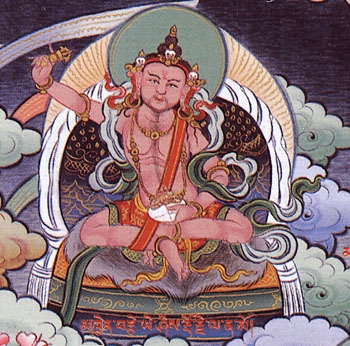Do Khyentse Yeshe Dorje

Do Khyentse Yeshe Dorje (Tib. མདོ་མཁྱེན་བརྩེ་ཡེ་ཤེས་རྡོ་རྗེ་, Wyl. mdo mkhyen brtse ye shes rdo rje) (1800-1866[1]) — the mind emanation of Jikmé Lingpa.[2] He was said to be the son of the protector Nyenchen Tanglha. His main teacher was the First Dodrupchen, Jikmé Trinlé Özer. His life featured many miraculous events, especially during his childhood, and in later life he lived as a hunter, like some of the mahasiddhas of ancient India. He famously introduced Patrul Rinpoche to the nature of mind while beating him and dragging him by the hair.
Children
- Khaying Dölma (1823-1855)
- Sherap Mebar (1829-1842), a tulku of the first Dodrupchen, Jikmé Trinlé Özer
- Dechen Rigpé Raldri (rig pa'i ral gri) (1830-1896), a tulku of Gyalsé Nyinché Öser (1793-?), the son of Jikmé Lingpa
Reincarnations
The incarnations of Do Khyentse Yeshe Dorje are divided into (at least) three lines:
- Khyentse Tulku Dzamling Wangyal (1868-1907), a son of Dudjom Lingpa. This line of incarnation seems to have ended after this tulku passed away.
- The first Alak Zenkar Rinpoche, Pema Ngödrup Rolwe Dorje (1881-1943), whose incarnation is Alak Zenkar Rinpoche.
- Doring Tulku, Doring Tuksé Doring Choktrul Rinpoche (1902-1952) from Minyak, who became an important student of Khenpo Shenga, and established Nyimalung Monastery in Bhutan.
On several occasions, the 16th Karmapa mentioned that he considered Sogyal Rinpoche to be an emanation of Do Khyentse.
Terma Revelations
- Dzinpa Rangdrol (Tib. འཛིན་པ་རང་གྲོལ་, Wyl. 'dzin pa rang grol), 'Natural Liberation of Grasping', a famous Chöd practice
Writings
Note: "Foolish Babble Clarifying Reality: Notes on the Generation and Perfection Stages" (bskyed rdzogs kyi zin bris blun gtam de nyid gsal ba), often attributed to Do Khyentse,[3] is actually the work of Dola Jikmé Kalzang.[4]
Alternative Names
- Rigdzin Jalü Dorje ( 'ja' lus rdo rje)
- Traktung Lekyi Pawo
Notes
- ↑ His anniversary is celebrated on the 20th day of the 2nd month of the Tibetan lunar calendar.
- ↑ According to Masters of Meditation and Miracles (pages 179 & 338), he was the mind incarnation, and the source for this is the biography of Patrul Rinpoche composed by Khenpo Kunpal. In that biography, Khenpo Kunpal does indeed say that Do Khyentse was the mind incarnation, Patrul Rinpoche the speech incarnation, and Jamyang Khyentse Wangpo the body incarnation. On page 133 of Masters of Meditation & Miracles, Tulku Thondup says that Do Khyentse was the body incarnation, and Jamyang Khyentse Wangpo was the mind incarnation, but since the same reference to Khenpo Kunpal is given this appears to be a mistake.
- ↑ See, for example, Ringu Tulku, Daring Steps Towards Fearlessness, Snow Lion 2005
- ↑ Information provided by Alak Zenkar Rinpoche
Further Reading
In Tibetan
- རིག་འཛིན་འཇིགས་མེད་གླིང་པའི་ཡང་སྲིད་སྔགས་འཆང་འཇའ་ལུས་རྡོ་རྗེའི་རྣམ་ཐར་མཁའ་འགྲོའི་ཞལ་ལུང་, rig 'dzin 'jigs med gling pa'i yang srid sngags 'chang 'ja' lus rdo rje'i rnam thar mkha' 'gro'i zhal lung (autobiography)
 རིག་འཛིན་འཇིགས་མེད་གླིང་པའི་ཡང་སྲིད་སྔགས་འཆང་འཇའ་ལུས་རྡོ་རྗེའི་རྣམ་ཐར་མཁའ་འགྲོའི་ཞལ་ལུང་, rig 'dzin 'jigs med gling pa'i yang srid sngags 'chang 'ja' lus rdo rje'i rnam thar mkha' 'gro'i zhal lung
རིག་འཛིན་འཇིགས་མེད་གླིང་པའི་ཡང་སྲིད་སྔགས་འཆང་འཇའ་ལུས་རྡོ་རྗེའི་རྣམ་ཐར་མཁའ་འགྲོའི་ཞལ་ལུང་, rig 'dzin 'jigs med gling pa'i yang srid sngags 'chang 'ja' lus rdo rje'i rnam thar mkha' 'gro'i zhal lung
In English
- Nyoshul Khenpo, A Marvelous Garland of Rare Gems: Biographies of Masters of Awareness in the Dzogchen Lineage, Padma Publications, 2005, pages 395-399.
- Ringu Tulku, Daring Steps Towards Fearlessness: The Three Vehicles of Buddhism, Snow Lion, 2005 (Includes a translation and commentary to Do Khyentse's Babble of a Fool, a text on Kyerim)
- Robin Kornman, 'A Tribal History' in Donald S. Lopez (ed.) Religions of Tibet in Practice, Princeton University Press, 1997 (includes a translation of an extract from Do Khyentse's Autobiography on the History of the Goloks)
- Tulku Thondup, Masters of Meditation and Miracles, Shambhala, 1996, pages 179-197.